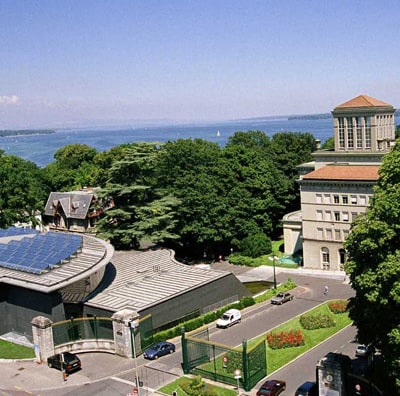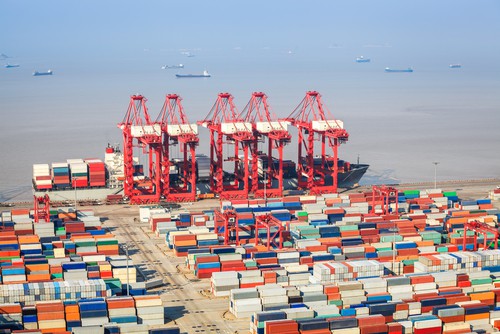China’s trade authorities are to respond ‘as soon as possible’ to global concerns over restrictions on the import of waste products to the country.
Last Friday (20 April), a meeting of the Committee on Import Licensing of the World Trade Organization, heard concerns expressed over measures affecting waste products imposed by China with the Chinese government representatives at the meeting promising to respond soon.

The Committee met last Friday at the World Trade Organization headquarters in Geneva
The restrictions include those on the imports of certain types of plastics and recovered paper for recycling and also ferrous and non-ferrous metal items.
The latest discussion over the global concerns come as markets for most of the materials covered start to improve in the UK.
Plastic
Prices for plastic film and other materials (apart from very contaminated or very low grade material) have firmed with a higher oil price and a strong PRN value helping.
Paper
In the recovered paper sector, the prices paid per tonne for used cardboard meeting China’s strict 0.5% contamination level have reached the £90 mark and are expected to top the £100 per tonne level soon. But, prices for used cardboard to other countries, typically at less than a 90:10 grade are some £20+ behind the China figure. Exports to China now have to be of a 90:10 grade or better such as 95:5 or 98:2 – or above – where the smaller figure is for grey board or similar material. There is discussion over whether China’s authorities will accept coloured card with different views existing over this.
Prices for mixed papers have recovered a little too with £7 per tonne a common export value. But the operators of materials recycling facilities are still having to double sort material at extra cost and are keen for local authorities to help minimise contamination in household recycling. And, prices for mixed paper are still substantially below those seen in the past few years with a consequent big hit on contractor and local authority income.
Softening?
Whether the concerns raised at the World Trade Organization will lead to any softening in approach by China remains unclear as President Xi Jinping has brought in the measures to help improve China’s environment as well as boost the country’s use of internal resources. Meanwhile, observers say that so far overall the implementation of the quality requirements seems to have gone smoothly and a learning process is in operation on both sides. However, one observer said it will be interesting to see how China responds if some of its reprocessors run short of raw material in the face of rising pulp prices and a shortage of acceptable material.
European Union
Last Friday’s meeting heard six members of the World Trade Organization, including the European Union (including the UK) press China to prove more information on its measures affecting waste products and also on feed wheat, pulses and some other goods.
The Committee on Import Licensing, under new chair Ms Lorena Rivera Orjuela (Colombia), discussed the measures at the instigation of the EU.
The WTO said that China was requested “to provide a complete list of products subject to import licences, a detailed description of import procedures applicable to waste products, and clarification on whether China intended further amendments to the measures currently in force.”

China has promised to respond to concerns about the country’s import restrictions on waste products
Among the EU questions was one relating to traders sourcing materials for recycling in China. The EU asked about “Changes on the conditions for the issuance of import licences, i.e. import licences not issued any longer to traders but only to processors in China.”
And, Korea said that China, “being a large trading member, should ensure its measures are carried out in a transparent and cautious manner considering its huge impact on the global recycling chain.”
The United States, noted the WTO, said it was disappointed about the lack of notification and requested a halt in the implementation of the import restriction and sought less trade-restrictive measures. Japan said the restrictions have already made a significant impact and that it would like to continue discussions with China and other members on this issue. Australia and Canada also sought further clarification on the issue.
“Severely restricting the import of these materials into China might then increase the price of those raw materials, thereby harming the competitiveness of Chinese processors.”
Canadian representative
WTO Committee
China, in response, told the Committee that it was fully committed to the WTO agreements. China said it was carefully reviewing the questions and will provide a written response as soon as possible.
‘Mutually beneficial’
Minutes of a meeting discussing the waste import restrictions last autumn show concerns from around the globe. The representative of Canada argued that the trade in recyclable materials was mutually beneficial because Canada was not able to process many of these materials as efficiently as China could, and because Chinese companies in turn obtained valuable raw materials from Canadian sources.
The Canadian representative cautioned: “Severely restricting the import of these materials into China might then increase the price of those raw materials, thereby harming the competitiveness of Chinese processors. In this regard, Canada encouraged China to consider all possible mechanisms to ensure that this lucrative trade was not disrupted while at the same time limiting any harmful environmental impact.”
The post China to respond ‘soon’ over import concerns appeared first on letsrecycle.com.
Source: letsrecycle.com Plastic



